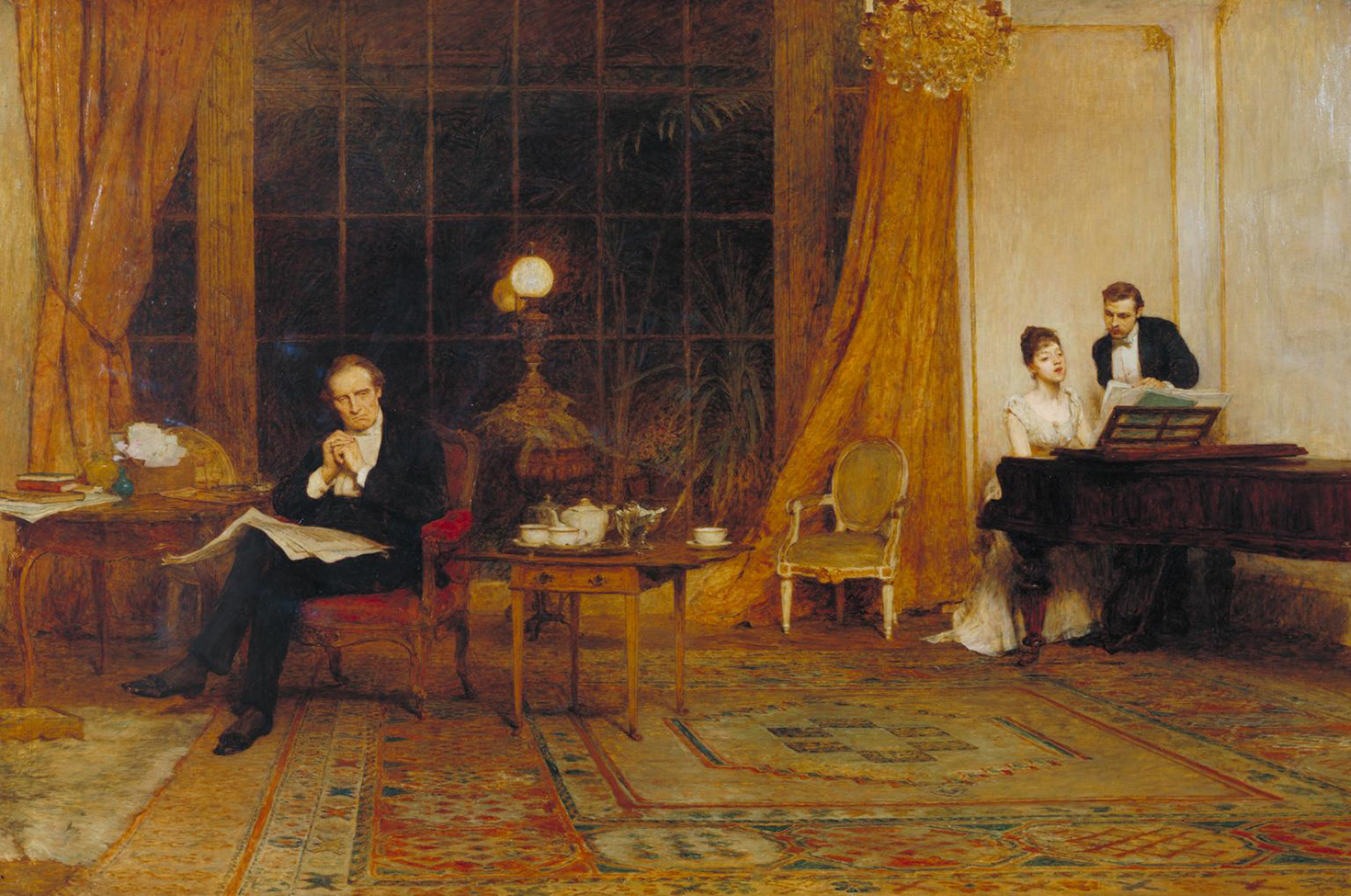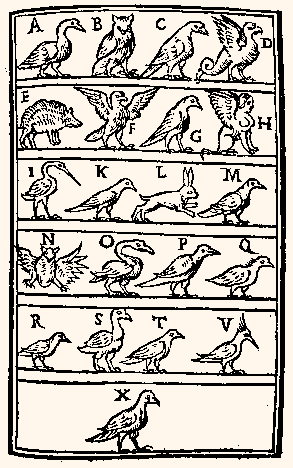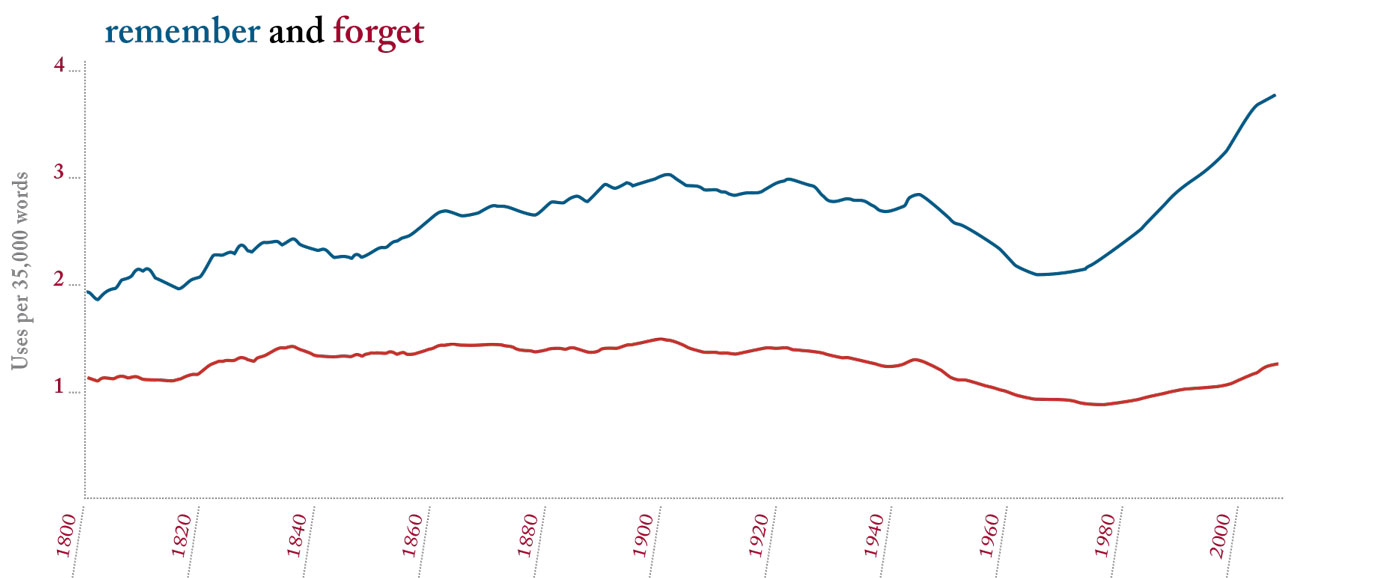
Her Mother’s Voice, by Sir William Quiller Orchardson, 1888. Photograph © Tate (CC-BY-NC-ND 3.0).
amnesia: Loss of memory. From Greek ἀμνηστία, forgetfulness. First use: 1786.
amnesty: An official pardon for those who are convicted of political offense. From Greek ἀμνηστία, forgetfulness.

artificial memory
A system of mnemonic devices; the use of mnemonics. From Latin artificiosa memoria; compare Latin ars memorie artificialis. The first printed work to mention memoriae ars is the 1482 treatise Oratoriae Artis Epitome, by Jacobus Publicius. At right: a woodcut from Johann Horst von Romberch’s Congestorium artificiose memorie, 1520.
chunking: A memory technique involving the breaking up of content into distinct units of information.
cryptomnesia: The phenomenon of perceiving a latent or subconscious memory as an original thought or idea.
defrag: To rearrange software files into the smallest possible regions on a hard disk for faster access.
déjà huh: The feeling of having previously forgotten the same information now being encountered.
déjà vu: (French) Lit. “already seen.” The illusory feeling of having previously experienced a situation.
dissociation: A psychological process that results in disconnection; a loss of continuity among thoughts, memories, and surroundings.
efface: “To destroy any impression on the mind; to wear away; as, to efface the image of a person in the mind.”—Noah Webster, American Dict. of the Eng. Language
eidetic memory: The ability to recall an image after seeing it once. Similarly, photographic memory is the ability to recall an image for an exceptionally long period. From εἶδος, form.
engram: A memory trace; a permanent and heritable physical change in a brain’s nerve tissue, said to account for the existence of memory.
erase: To obliterate from the mind or memory. “My griefs have dulled my memory, and eras’d almost everything out of it.”—Richard Preston, 1695
forgetfulness: “A gift of god bestowed upon debtors in compensation for their destitution of conscience.”—Ambrose Bierce, The Devil’s Dictionary

forget-me-not
Various species of Myosotis, esp. M. palustris, a plant that flourishes in damp or wet soil. In the 15th cent. the flower was said to ensure those wearing it would never be forgotten by their lovers. From a translation of the Old French ne m’oubliez mye or German Vergissmeinnicht.
gaslight: (v.) To psychologically manipulate a person into questioning his or her sanity. From George Cukor’s 1944 film Gaslight, from a 1938 play by Patrick Hamilton.
hippocampus: Either of two structures in the brain that are involved in diverse processes, including memory. From Latin hippocampus, a monster with a horse’s body and fish’s tail, on which sea gods ride.
hiraeth: (Welsh) A bittersweet memory of missing something or someone.
hypermnestic: Having a morbidly retentive memory.
kartu memori: (Indonesian) A memory card, used for storing digital information.
jāhilīyah: جَاهِلِيَّة (Arabic) A state of ignorance; the period of Arabian history prior to the teachings of Muhammad. From jāhil, ignorant.
Korsakoff syndrome: A type of psychosis often resulting from chronic alcoholism and characterized by disorientation, memory loss of recent events, and consequent confabulation. From Russian physician S.S. Korsakoff (1854–1900).
Mandela effect: A type of false memory that refers to pop culture or current events; remembering something that doesn’t match historical records; a shared false memory. From the widely held erroneous belief that Nelson Mandela died in prison in the 1980s.
memento mori: (Latin) Lit. “remember that you will die.” A reminder of the inevitability of mortality, esp. a skull or other symbolic object in art.
memory: “The power to revive again in our minds those ideas which, after imprinting, have disappeared, or have been, as it were, laid aside out of sight.”—John Locke, 1689
memory holing: To delete online content. From George Orwell, Nineteen Eighty-Four: “He crumpled up the original message and any notes that he himself had made and dropped them into the memory hole to be devoured by the flames.”
memory root: The Indian turnip Arisaema triphyllum, an aroid plant with an acrid corm that causes a burning sensation when chewed; the corm itself. Once tasted raw, it can never be forgotten.
memorabilia: Things that are remarkable and worthy of remembrance. First known use: 1785.
mnemonic: A device to aid memory; spec., a pattern of letters, ideas, or associations that assists in remembering (e.g., the fate of Henry VIII’s wives: divorced, beheaded, died, divorced, beheaded, survived).
nepenthe: A potion or drug that brings forgetfulness or relief from pain or anguish.
nostalgia: A wistful yearning for a return to some past period or irrecoverable condition. Akin to Greek νεῖσθαι, to return, Sanskrit nasate, he approaches.
nostalgie de la boue: (French) Lit. “nostalgia of the mud.” An attraction to what is crude or depraved.
nostomania: An extreme homesickness, formerly regarded as a type of insanity. From Greek νόστος, return home, and -μανία, mania.
Ohrwurm: (German) Lit. “earworm.” A tune or piece of music that persists in a person’s mind, esp. to the point of irritation.
paramnesia: Memory that is unreal. “The subtle, recurring confusion between illusion and reality that was characteristic of paramnesia fascinated the chaplain.”—Joseph Heller, Catch-22
record: Of a bird, to practice or sing a tune in an undertone; to go over a song quietly; to produce subsong.
remember your courtesy: Put your hat on. As in: “I beseech you remember. [Hamlet moves him to put on his hat.]”
reminder: A usually mild physical symptom regarded as a manifestation of latent syphilis.
rue: To feel sorrow, remorse, or regret. From Old English hreow, sorrow.
Sanskrit effect: The hypothesis that memorizing Vedic mantras (typically between 40,000 and 100,000 words) increases the size of brain regions associated with cognitive functions such as memory.
souvenir: Something given or kept as a reminder of a place, person, event, etc.; a keepsake; spec., a typically inexpensive item sold to tourists that has an association with the place visited. From Latin subvenīre, to come to the aid of.

tabula rasa: (Latin) Lit. “scraped tablet.” The mind in a hypothetical primary blank state prior to receiving outside impressions. Comparison of the mind to a blank writing tablet dates to Aristotle’s On the Soul (4th cent. bc).
trauma: A psychic injury, esp. one caused by emotional shock, the memory of which is repressed and remains unhealed. From Greek τραῦμα, wound.
ubi sunt: (Latin) Lit. “Where are they?” A meditation on the mutability of things and the transitoriness of human life. “Where are the snows of yesteryear?”—François Villon, 1533
Yekatit 12: The date in the Ethiopian calendar referring to the Addis Ababa massacre of February 19, 1937, in which Italian forces killed a fifth of the city’s population. Wreaths continue to be laid at the capital’s Sidist Kilo monument in commemoration.
zakhor: זֵכֶר (Hebrew) An imperative to remember; a verb used in the Hebrew Bible whenever Israel is admonished.
Explore Memory, the Winter 2020 issue of Lapham’s Quarterly.